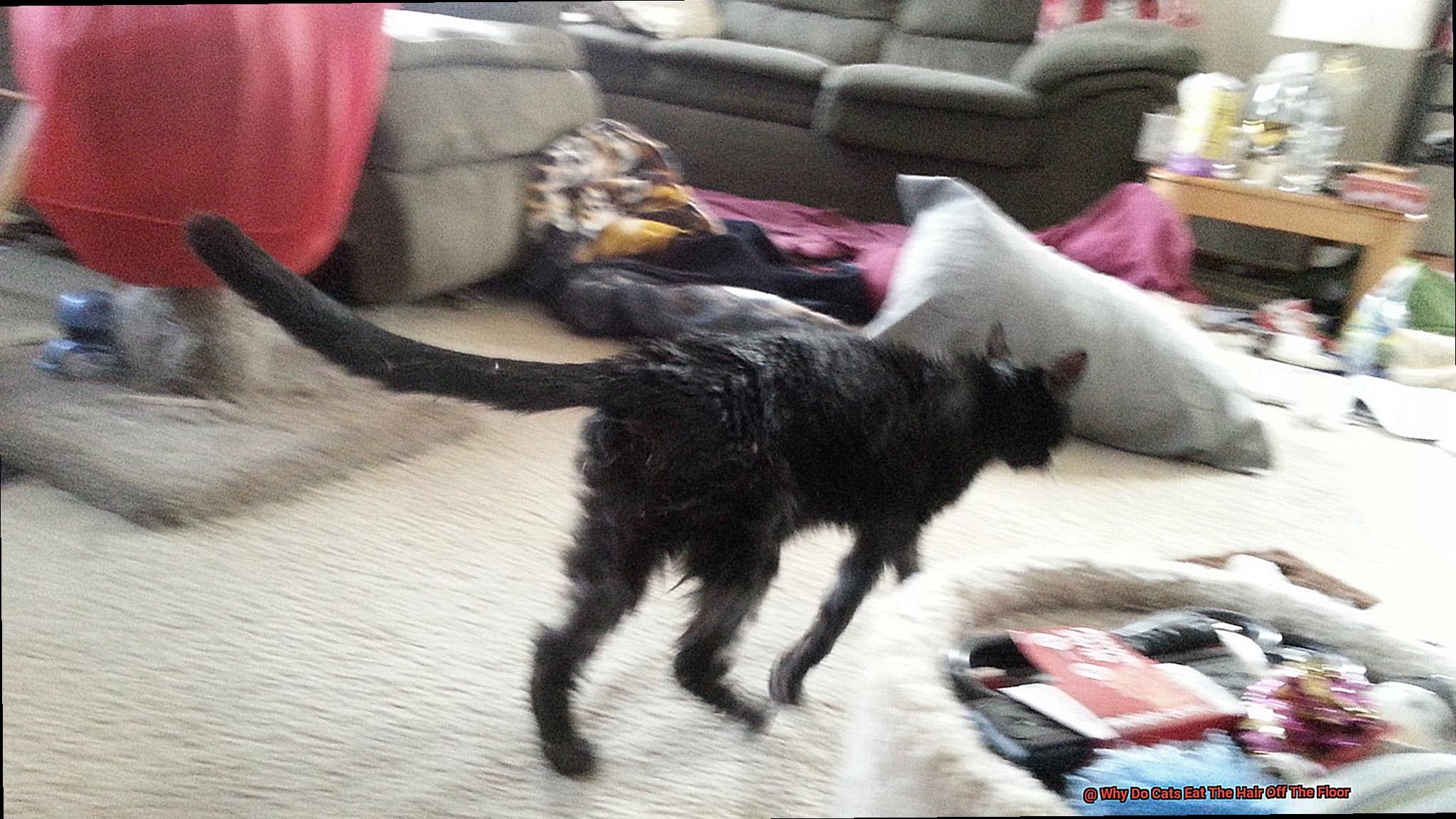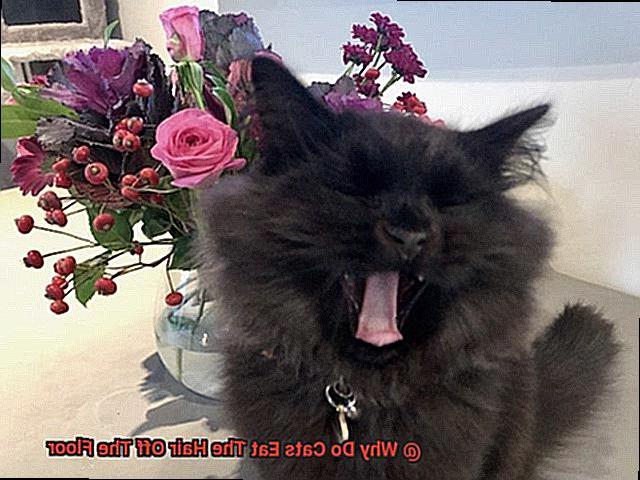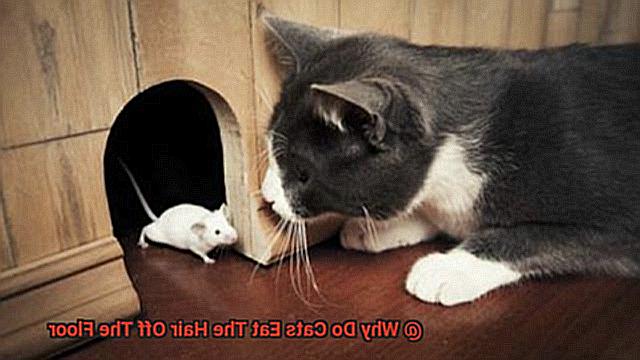Ever noticed your cat eating their own hair or the hair off the floor? It may seem strange, but it’s actually quite normal. So why do cats eat the hair off the floor?
There are a few explanations for this behavior. We’ll discuss why cats eat their own fur and hair off the ground, as well as what you can do to discourage them from doing so in this blog post.
It’s important to note that cats don’t just start consuming their own hair or the hair off the floor. This behavior is usually due to an internal cause. Stress, boredom, fear, nutritional inadequacy and even medical disorders like feline diabetes or hyperthyroidism could be factors.
Cats can engage in repetitive habits such as excessive grooming or eating their own fur due to boredom. Cats may also have pica, which is an unusual craving for non-food items like wool, fabric or even their own fur. If a cat isn’t getting enough nutrients from their diet, they may be tempted to consume their own fur because it contains essential vitamins and minerals they need.
If your cat is displaying this behaviour it’s vital to see a specialist so any underlying medical conditions can be ruled out first.
If any medical problems have been addressed you can help reduce anxiety and increase excitement in your cat’s environment with interactive toys and playtime with you, plus plenty of places to hide when they need some alone time.
We can help our cats stay healthy and happy by understanding why cats eat the hair off the floor.
The Natural Instinct of Cats to Hunt and Eat Hair
Cats have a natural instinct to hunt and eat hair, a behavior that can be beneficial in some cases, but also potentially dangerous if done in excess.
Cats are hunters, and their ancestors must have eaten the entire prey in order to survive. This means that cats hunt, they often ingest hair with their prey as well. Hair contains essential nutrients such as fiber and protein, which aids cats in regulating their bowel movements and aids digestion.
Sometimes cats will eat hair due to a nutritional deficiency. Keratin, a protein that helps promote healthy skin and coat, is present in hair. If your cat’s diet is lacking these elements, they may resort to eating hair as a way of compensating for what is missing in their diet. Stress or boredom can also lead cats to seek out sources of nutrition like eating hair off the floor.

To discourage cats from consuming too much hair, it is important to provide them with plenty of exercise and stimulating toys to fulfill their hunting instincts.
Regular brushing can also help remove loose hair before it has a chance to accumulate on floors or furniture.
Health Benefits of Eating Hair for Cats
Cats have a habit of eating hair off the ground, and while it may seem strange, it can actually provide some health benefits.

For starters, eating hair can help cats with their digestive health. Hairballs can form in cats’ stomachs and cause vomiting or constipation, but they can prevent this by ingesting loose hairs off the floor or grooming themselves.
Eating hair also provides some nutritional value for cats, as it contains small amounts of fiber and protein that contribute to their overall health.
Finally, chewing on hair strands helps clean your cat’s teeth and gums naturally. This removes food particles, debris, and plaque from their teeth.
It is important to note that there are also risks associated with cats eating hair. Consuming large amounts of hair can lead to gastrointestinal problems such as intestinal blockages which can be life-threatening.
Potential Problems with Eating Too Much Hair
Cats have a natural tendency to groom themselves and, as a result, they may ingest too much hair. Although this behavior may have some health benefits, it can also lead to a range of issues if cats consume excessive amounts of fur.
Digestive problems such as vomiting, constipation, and diarrhea can arise from eating too much hair. Hairballs can become lodged in the digestive tract and block food from passing through, potentially leading to life-threatening complications if not addressed quickly.
Pica is another condition associated with excessive hair ingestion; this disorder causes cats to crave and eat non-food items like hair which can lead to additional health complications.
Choking and difficulty swallowing are also potential problems when cats eat too much hair; the fur may become stuck in their teeth or throat. Excessive grooming can also cause skin conditions such as inflammation, hair loss, and open wounds.
To prevent these issues from arising, cat owners should groom their cats regularly with a brush to remove excess fur from their coat. Hairball remedies or specialized diets can also help minimize the amount of ingested fur.
Additionally, limiting access to items with excess hair such as carpets or blankets is important; these items should be vacuumed regularly.
Nutritional Deficiencies Can Lead to Hair Eating
Cats are obligate carnivores, meaning their bodies require animal-based proteins to meet their nutritional needs. When cats are not fed a balanced diet, they may develop pica, a disorder where they crave and consume non-food items such as human and animal hair.
In particular, one of the primary causes of nutritional deficiencies in cats is a lack of essential amino acids like taurine. This amino acid is found in animal tissue and helps maintain the proper functioning of a cat’s cardiovascular and digestive systems.
Without an adequate amount of taurine in their diet, cats can suffer from obesity, heart disease, and digestive problems.
Furthermore, inadequate nutrition can also lead to dry and itchy scalps which cause cats to groom excessively. This excessive licking results in hairballs forming in their stomachs which can cause blockages in the digestive tract if left untreated. In severe cases, these blockages can be fatal.

Therefore, it is important to provide your cat with proper nutrition and a balanced diet to avoid these health issues.
Make sure your cat gets enough protein, fats, minerals and other essential ingredients for optimal health.
Stress and Boredom Can Also Cause Cats to Eat Hair
It could be a sign that they are dealing with stress or boredom. Cats thrive on routine and predictability, so sudden changes in their environment or disruption to their daily routine can cause them to experience stress and anxiety. Eating hair off the ground can be a way for them to self-soothe and cope with these feelings.
Boredom is another common cause of cats eating their hair. These intelligent creatures need plenty of mental stimulation and physical activity to stay content. If your cat is living in an unenriched environment, they may start engaging in repetitive behaviors such as over-grooming or consuming hair strands as a way to pass the time. To prevent boredom, make sure you provide your cat with lots of toys, scratching posts, and playtime.
If your pet is eating hair due to stress or boredom, it’s essential to identify the root cause and address it accordingly.
Talk to your veterinarian about potential solutions such as environmental enrichment, behavior modification techniques, pheromone therapy, medications, and spending more quality time with your feline friend.
How To Monitor Your Cat’s Hair Ingestion

It’s a common problem, and if left unchecked, it can have serious implications for your cat’s health. Fortunately, there are some simple ways to monitor your cat’s hair ingestion and keep them safe and healthy.
It’s important to note that some hair ingestion is normal for cats as they naturally groom themselves and ingest hair in the process. However, excessive hair ingestion can lead to digestive issues such as hairballs, constipation, or even intestinal blockages.
One way to monitor your cat’s hair ingestion is to track how often they are grooming themselves. If you notice that your cat is excessively grooming or chewing on their fur or licking in a specific spot, it may be a sign that they are ingesting too much hair. Regular brushing can also help remove loose fur before it becomes ingested.
Another way to monitor your cat’s hair ingestion is to provide them with specialized diets formulated to reduce the risk of developing hairballs. These diets contain high-fiber ingredients that aid in digestion and facilitate the elimination of ingested hair.
Additionally, keeping an eye on their litter box habits may help identify any potential issues related to excessive hair ingestion.
Finally, regular check-ups with your veterinarian can help detect any potential issues related to their digestive system and provide advice on laxatives or other remedies if necessary.
Ensuring Your Cat Has a Balanced Diet
A balanced diet is essential for your cat’s overall health and wellbeing. It’s not just about feeding them the right food, but also ensuring that they are getting all the necessary nutrients in the right amounts. Protein is especially important for cats, as it helps with growth and development, as well as maintaining their muscle mass.
Carbohydrates should make up a smaller portion of their diet, but fat is also an essential nutrient for cats, providing energy and essential fatty acids. In addition to these macronutrients, your cat also needs a range of vitamins and minerals to stay healthy.
To ensure your cat has a balanced diet, choose high-quality, nutritionally complete cat food that is appropriate for their age and health status.
You can also supplement their diet with occasional treats or fresh foods such as cooked meat or vegetables.
_B2QO1G5x0c” >
Providing Stimulation to Prevent Stress and Boredom
Studies have shown that cats are naturally predators, and their instinctive behavior includes ingesting hair with their prey. Although this activity may have some health benefits, it can also result in hairballs. Fortunately, providing your cat with plenty of stimulation can help them avoid engaging in this strange habit.
Mental and physical stimulation are essential for cats to remain healthy and happy. Interactive toys such as puzzle feeders, treat balls, and wand toys can keep them entertained for hours while distracting them from eating hair off the ground.
Physical stimulation is also important; providing a cat tree or scratching post allows them to partake in activities such as jumping, climbing, and scratching – all of which release endorphins that reduce stress and anxiety. Finally, giving your cat a comfortable sleeping area helps reduce boredom and stress levels.
Also Read: Why Does My Cat Eat With Her Paw?
Conclusion
It’s normal for cats to eat hair, but if they do it in excess, it can be costly. Stress and boredom are two of the main causes of cats consuming their own fur or hair off the floor.
To discourage this behavior, owners should provide their cats with a variety of interactive toys and playtime, as well as places to hide when they need some alone time. Regular brushing will also help eliminate loose hair before it accumulates on floors or furniture.
Nutritional deficiencies can also contribute to excessive hair-eating habits; cats require animal-based proteins to stay healthy and meet their nutritional requirements. To prevent health issues related to eating too much fur, providing your cat with proper nutrition and a balanced diet is essential.
It’s important to track your cat’s fur consumption and take proactive steps to avoid any potential health problems. If necessary, regular check-ups with your veterinarian can help identify any digestive system issues and provide tips on laxatives or other medications.
Providing stimulation through interactive toys, scratching posts, and playtime is also important for keeping your cat content and healthy.







